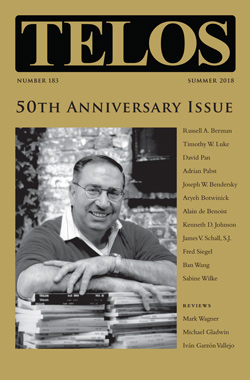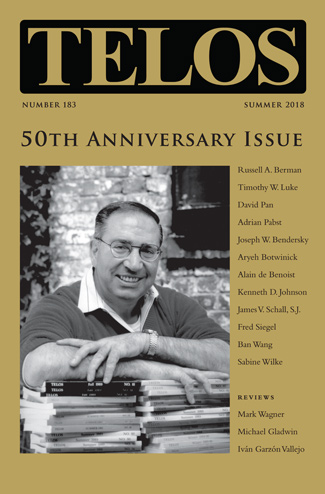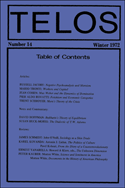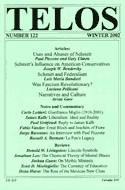By David Pan and Mark S. Weiner · Monday, September 13, 2021 In anticipation of our two-hundredth issue, the editorial board of Telos is organizing an exciting new international initiative: the Telos Student Seminars (TSS). We are reaching out to you as a valued friend of the journal in the hope that you will be a part of our efforts.
Modeled on the study groups from which Telos first grew, yet reconceived for the digital age, the Telos Student Seminars will provide a forum for students around the world to engage with critical theory by discussing a common set of paired texts from Telos—one current essay, and one pertinent essay from our archives—guided by questions drawn up by our student interns and our editorial board. These questions will seek to connect the past and present of the journal to its future.
We seek faculty from around the world under whose aegis TSS groups can meet and who can provide students with intellectual encouragement and support. These friends of Telos will be designated as our Seminar Conveners. We would be thrilled if you would serve in this special capacity. Conveners are responsible for ensuring that their institutions have a subscription to Telos and its backfile so that students can participate—they can do so by contacting their university librarians.
Continue reading →
By Telos Press · Friday, August 10, 2018 Telos 50th Anniversary Sale! To help celebrate the 50th anniversary of Telos, we are offering a 20% discount on individual subscriptions and books purchased through the Telos Press website! Just use the coupon code TELOS50 during the checkout process. Offer expires August 31, 2018.
Writing at City Journal, Fred Siegel reports on the lively conversations at the Telos 50th anniversary event, held in June in New York City. An excerpt:
 Describing the vibrant intellectual life of New York in the late 1940s and early 1950s, Anatole Broyard’s Kafka Was the Rage is one of my favorite books. “Alienated from alienation,” Broyard was fascinated by the lively parties where people debated so intensely that “we didn’t know where books ended and we began.” Describing the vibrant intellectual life of New York in the late 1940s and early 1950s, Anatole Broyard’s Kafka Was the Rage is one of my favorite books. “Alienated from alienation,” Broyard was fascinated by the lively parties where people debated so intensely that “we didn’t know where books ended and we began.”
Recently, I had the good fortune to attend such a gathering: a celebration held in honor of the 50th anniversary of Telos, the lively, unpredictable highbrow magazine founded in 1968 by Paul Piccone, then a graduate student in philosophy at the University of Buffalo. Piccone died in 2004, but Telos, unsubsidized by any university and unwilling to bend to any ideology, has continued as an independent journal under the talented tutelage of his widow, Mary, and the current editor, Russell Berman, who has written insightfully about the great German writer Ernst Jünger. Telos began as part of the New Left but later broke with all orthodoxy, publishing the Schmittians of the Left and Gramscians of the Right (referring to hard-Right 1930s German political philosopher Carl Schmitt and 1930s Italian Marxist Antonio Gramsci, both back in vogue today, but in unexpected places).
Continue reading →
By Timothy W. Luke · Wednesday, July 11, 2018 On June 8, 2018, Telos celebrated its fiftieth anniversary at a special event held in New York City. Speakers included Telos editors Russell Berman, Tim Luke, David Pan, and Adrian Pabst, as well as Jacob Siegel, who delivered a talk on “Telos, Post-liberal Politics, and a Veteran’s Reading of Ernst Jünger.” Videos of the event are available at the Telos-Paul Piccone Institute website. Telos 183 (Summer 2018), our fiftieth anniversary issue, is available for purchase in our store. Presented below is a transcript of Tim Luke’s remarks at the anniversary event.
To address the history of Telos, I will open this brief account tonight about the journal by recalling my history with Telos since 1975. As a new cadre in “the St. Louis TELOS group,” I began by unloading boxes of Telos 26 (Winter 1975–76) from a panel truck early on a Saturday morning during the winter break outside of McMillan Hall, where Paul Piccone and the Telos office were embedded in the Sociology Department of Washington University, St. Louis. Working then as what we call an “intern” today, I soon was translating “into” the American English various versions of different draft manuscripts. Many articles at that time came through the mail as pages of disorderly text that another individual, like the author or an associate, with some English skills translated “out of” Czech, German, Hungarian, Italian, or Polish into a global semi-Anglophonic creole.
Continue reading →
By Russell A. Berman · Monday, June 11, 2018 Telos 183 (Summer 2018), celebrating the fiftieth anniversary of the journal Telos, is now available for purchase in our store.
 Telos began this anniversary year with our previous issue’s exploration of the legacy of Martin Luther King, Jr., tragically assassinated fifty years ago in April. That too was 1968, the excitement of profound social change and the bitter taste of disappointment. So much in our culture today remains framed by that specific polarity. Now, in this issue of the journal, we take stock more broadly: not a judgment on that one year but a return to some of the key themes that have defined Telos. We have been able to carry on these discussions thanks to the vision of the founder, Paul Piccone, the support of our publisher, Mary Piccone, the dedication of our editorial group, the intellectual agility of our authors, and the loyalty of our readers. Thanks to all. Telos began this anniversary year with our previous issue’s exploration of the legacy of Martin Luther King, Jr., tragically assassinated fifty years ago in April. That too was 1968, the excitement of profound social change and the bitter taste of disappointment. So much in our culture today remains framed by that specific polarity. Now, in this issue of the journal, we take stock more broadly: not a judgment on that one year but a return to some of the key themes that have defined Telos. We have been able to carry on these discussions thanks to the vision of the founder, Paul Piccone, the support of our publisher, Mary Piccone, the dedication of our editorial group, the intellectual agility of our authors, and the loyalty of our readers. Thanks to all.
Continue reading →
By Joseph van der Naald · Wednesday, December 3, 2014  Mario Tronti’s postscript to the second edition of his publication Operai e Capitale, published in Telos in 1972 as “Workers and Capital,” provides the reader with a summation of his thought on the development of the “mass worker,” presented through an analysis of notable labor struggles across the Western world. Tronti’s methodology, which he briefly explicates at the beginning of the piece, delineates certain historical workers’ struggles in order to examine “macroscopic groups of facts yet untouched by the critical consciousness of labor thought” (25). His purpose is to yield “an historical model, a privileged period of research” (25) so as to better analyze the emergence of the autonomy of the working class engaged in a dialectical struggle with capital. Mario Tronti’s postscript to the second edition of his publication Operai e Capitale, published in Telos in 1972 as “Workers and Capital,” provides the reader with a summation of his thought on the development of the “mass worker,” presented through an analysis of notable labor struggles across the Western world. Tronti’s methodology, which he briefly explicates at the beginning of the piece, delineates certain historical workers’ struggles in order to examine “macroscopic groups of facts yet untouched by the critical consciousness of labor thought” (25). His purpose is to yield “an historical model, a privileged period of research” (25) so as to better analyze the emergence of the autonomy of the working class engaged in a dialectical struggle with capital.
Continue reading →
By Michael Millerman · Tuesday, August 12, 2014  Like Spinoza, many liberal thinkers have defined the liberty they promote in terms of the necessity of submitting to the law that guarantees it. This is a unique kind of rule of law, a rule of the “‘politically correct,’ universalist, managerial-liberal” (9) law of contemporary liberals. Both internationally and domestically, this law requires the muscular imposition of questionable political, moral, and economic principles, by means of an insidious and often nauseating bureaucratic, technocratic, mediacratic apparatus, onto largely unwilling publics. Crucially, the freedom championed by such liberals and allegedly secured by their law does not include the freedom to refuse their domination root and branch. Like Spinoza, many liberal thinkers have defined the liberty they promote in terms of the necessity of submitting to the law that guarantees it. This is a unique kind of rule of law, a rule of the “‘politically correct,’ universalist, managerial-liberal” (9) law of contemporary liberals. Both internationally and domestically, this law requires the muscular imposition of questionable political, moral, and economic principles, by means of an insidious and often nauseating bureaucratic, technocratic, mediacratic apparatus, onto largely unwilling publics. Crucially, the freedom championed by such liberals and allegedly secured by their law does not include the freedom to refuse their domination root and branch.
Continue reading →
|
|


 Mario Tronti’s postscript to the second edition of his publication Operai e Capitale, published in Telos in 1972 as “Workers and Capital,” provides the reader with a summation of his thought on the development of the “mass worker,” presented through an analysis of notable labor struggles across the Western world. Tronti’s methodology, which he briefly explicates at the beginning of the piece, delineates certain historical workers’ struggles in order to examine “macroscopic groups of facts yet untouched by the critical consciousness of labor thought” (25). His purpose is to yield “an historical model, a privileged period of research” (25) so as to better analyze the emergence of the autonomy of the working class engaged in a dialectical struggle with capital.
Mario Tronti’s postscript to the second edition of his publication Operai e Capitale, published in Telos in 1972 as “Workers and Capital,” provides the reader with a summation of his thought on the development of the “mass worker,” presented through an analysis of notable labor struggles across the Western world. Tronti’s methodology, which he briefly explicates at the beginning of the piece, delineates certain historical workers’ struggles in order to examine “macroscopic groups of facts yet untouched by the critical consciousness of labor thought” (25). His purpose is to yield “an historical model, a privileged period of research” (25) so as to better analyze the emergence of the autonomy of the working class engaged in a dialectical struggle with capital.  Like Spinoza, many liberal thinkers have defined the liberty they promote in terms of the necessity of submitting to the law that guarantees it. This is a unique kind of rule of law, a rule of the “‘politically correct,’ universalist, managerial-liberal” (9) law of contemporary liberals. Both internationally and domestically, this law requires the muscular imposition of questionable political, moral, and economic principles, by means of an insidious and often nauseating bureaucratic, technocratic, mediacratic apparatus, onto largely unwilling publics. Crucially, the freedom championed by such liberals and allegedly secured by their law does not include the freedom to refuse their domination root and branch.
Like Spinoza, many liberal thinkers have defined the liberty they promote in terms of the necessity of submitting to the law that guarantees it. This is a unique kind of rule of law, a rule of the “‘politically correct,’ universalist, managerial-liberal” (9) law of contemporary liberals. Both internationally and domestically, this law requires the muscular imposition of questionable political, moral, and economic principles, by means of an insidious and often nauseating bureaucratic, technocratic, mediacratic apparatus, onto largely unwilling publics. Crucially, the freedom championed by such liberals and allegedly secured by their law does not include the freedom to refuse their domination root and branch. 






